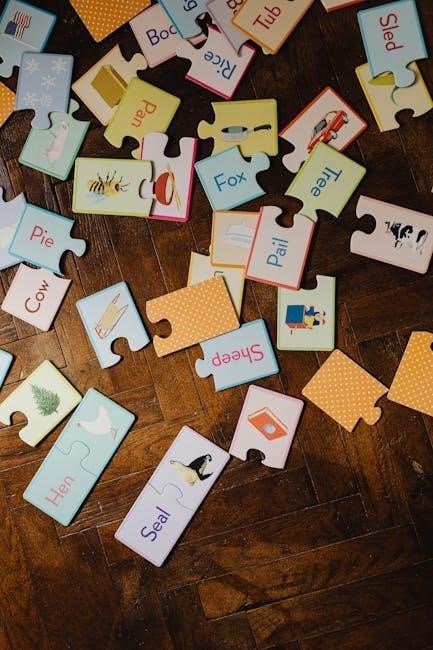Discover essential 3rd grade vocabulary words through interactive PDF resources, offering comprehensive lists, definitions, and engaging activities to enhance learning and retention for young students effectively.
Importance of Vocabulary Development in 3rd Grade
Vocabulary development in 3rd grade is crucial for improving reading comprehension, communication skills, and overall academic success. Expanding word knowledge enhances students’ ability to understand complex texts, express ideas clearly, and engage confidently in conversations. A strong vocabulary foundation supports better performance in various subjects and fosters a lifelong love for learning. By mastering high-frequency and grade-specific words, students gain the tools to decode unfamiliar terms and interpret meanings in context. This skill is essential for meeting curriculum standards and preparing for future educational challenges. Investing time in vocabulary practice ensures students build a robust linguistic base, empowering them to succeed academically and beyond.
Overview of Vocabulary Words Covered in 3rd Grade
In 3rd grade, vocabulary instruction focuses on a wide range of topics to broaden students’ linguistic knowledge. The curriculum includes terms related to animals and their babies, such as “cub” and “chick,” as well as transportation-related words like “helicopter” and “subway.” Students also learn school and home-related vocabulary, including “pencil” and “kitchen.” High-frequency words like “especially” and ” lov able” are emphasized to enhance reading fluency. Additionally, common sight words and challenging terms from literature are introduced to ensure a well-rounded understanding. These words are carefully selected to align with grade-level reading materials and state standards, preparing students for more complex texts in upcoming grades. Regular practice and review reinforce retention and application of these essential vocabulary terms.

Essential 3rd Grade Vocabulary Words
Mastering 3rd grade vocabulary involves learning words like “towering,” “journey,” and “enormous,” which enhance reading comprehension and communication skills, ensuring a strong academic foundation for students.
Animals and Their Babies
Understanding the names of animals and their babies is a key part of 3rd grade vocabulary. Words like “calf” (baby elephant), “cub” (baby lion), and “chick” (baby bird) introduce students to life cycles and relationships. These terms are often paired with engaging visuals to aid memory. Learning these words enhances descriptive language skills and fosters curiosity about the natural world. Activities such as matching games and fill-in-the-blank exercises make learning fun and interactive, helping students connect words to real-life concepts and build a stronger vocabulary foundation. This section is designed to make learning about animals and their young both enjoyable and educational for 3rd graders.

Transportation-Related Terms
Learning transportation-related terms is an exciting part of 3rd grade vocabulary. Words like “helicopter,” “submarine,” and “freight train” help students explore different modes of travel. These terms are often introduced through colorful illustrations and real-life examples, making them relatable and easy to understand. Students learn to identify vehicles used for land, air, and water travel, expanding their knowledge of how people and goods move around the world. Activities such as labeling diagrams and completing sentences with these words make learning interactive and fun. Mastering transportation vocabulary not only enhances language skills but also sparks curiosity about the world’s transportation systems and their importance in daily life.
School and Home-Related Vocabulary
School and home-related vocabulary helps students connect their daily lives with learning. Words like “principal,” “cafeteria,” and “pencil sharpener” are common in school settings, while terms like “laundry,” “kitchen,” and “garden” relate to home environments. These words are often taught through stories, pictures, and role-playing activities, making them relatable and easy to remember. Understanding these terms enhances students’ ability to communicate effectively about their routines and surroundings. Interactive exercises, such as matching games and fill-in-the-blank sentences, reinforce these vocabulary words, making learning engaging and practical for everyday use.

High-Frequency Vocabulary Words
High-frequency vocabulary words are commonly used terms that students encounter often. Examples include “afraid,” “especially,” and “lovable.” These words are essential for fluent reading and comprehension, and are often included in sight word lists to help students recognize them instantly, improving overall literacy skills effectively.
Afraid, Especially, Lovable, and Other High-Frequency Terms
High-frequency terms like afraid, especially, and lovable are foundational for 3rd graders. These words appear frequently in texts, making them crucial for recognition and comprehension. Afraid relates to fear, especially emphasizes particularity, and lovable describes affection. Mastery of these terms enhances reading fluency and vocabulary retention. They are often included in sight word lists and weekly assignments to ensure consistent practice. Using flashcards and interactive games can make learning these words engaging and effective for young students, while worksheets provide structured practice to reinforce their meanings and usage in sentences.
Common Sight Words for 3rd Grade
Common sight words are high-frequency words that students should recognize instantly. Examples include the, go, in, and is. These words are essential for reading fluency and comprehension. Many 3rd-grade vocabulary PDFs include sight word lists to help students master these terms. Sight words often don’t follow phonetic rules, making memorization key. Resources like flashcards, worksheets, and interactive games are effective tools for practice. Regular review ensures students can read and spell these words automatically; Incorporating sight words into sentences and stories reinforces their understanding and usage in everyday reading. This foundational skill builds confidence and improves overall literacy abilities for young learners.

Resources for 3rd Grade Vocabulary PDFs
Educational websites, textbooks, and workbooks offer comprehensive 3rd grade vocabulary PDFs. Resources like Education.com and Scholastic provide free, downloadable lists and engaging activities for students and teachers.

Education Websites Offering Free Vocabulary Lists
Several educational websites provide free 3rd grade vocabulary lists and resources. Education.com, Khan Academy, and CommonLit offer extensive collections of vocabulary words, definitions, and interactive activities. These platforms cater to both teachers and students, offering downloadable PDFs, printable worksheets, and online exercises. Many websites feature categorized lists, such as animal-related terms and transportation vocabulary, making it easier to focus on specific topics. Additionally, sites like Turtle Diary provide engaging games and puzzles to make learning fun. These resources are designed to support classroom instruction and home practice, ensuring students master essential vocabulary in an enjoyable and effective manner. They are easily accessible and updated regularly to meet educational standards.
Textbooks and Workbooks with Vocabulary Lists
Textbooks and workbooks are valuable resources for 3rd grade vocabulary development. Books like 240 Vocabulary Words Kids Need to Know: Grade 3 by Linda Ward Beech provide comprehensive lists of essential words. Many textbooks include unit-specific vocabulary lists, making it easier for teachers to align instruction with curriculum goals. Workbooks often feature engaging activities, such as matching games, crossword puzzles, and fill-in-the-blank exercises, to help students practice and retain new words. Additionally, some workbooks, like 3 Speaking and Vocabulary Book, offer interactive exercises that combine vocabulary building with speaking skills. These resources are widely available and can be used in both classroom and home settings to support active learning and consistent practice.
Free Downloadable PDFs for 3rd Grade Vocabulary
Free downloadable PDFs are an excellent way to access 3rd grade vocabulary words and practice materials. Websites like VocabularyPoint.com and educational platforms offer a wide range of free resources. These PDFs often include word lists, definitions, and interactive exercises to make learning engaging. Many documents are tailored to specific topics, such as animals and their babies or transportation-related terms, ensuring a well-rounded vocabulary. Additionally, some PDFs feature activities like matching games, crossword puzzles, and fill-in-the-blank exercises to reinforce learning. Teachers and parents can easily download these resources to provide students with fun and effective ways to practice vocabulary at home or in the classroom, making vocabulary building both accessible and enjoyable for young learners.

Practicing Vocabulary Words
Interactive activities and games make learning fun, while worksheets and flashcards provide structured practice for mastering 3rd grade vocabulary words effectively and engagingly.
Interactive Activities and Games
Engage students with fun and interactive activities that make learning vocabulary exciting. Websites like Turtle Diary offer online games and puzzles tailored for 3rd graders. Worksheets with word searches, crosswords, and matching exercises provide hands-on practice. Teachers can use flashcards with images and definitions to create memory games. Storytelling sessions where students use new words in their own stories foster creativity. Many PDF resources include quizzes and fill-in-the-blank exercises to reinforce learning. These activities not only improve retention but also make vocabulary practice enjoyable and dynamic for young learners, helping them build confidence in using new words effectively.
Worksheets and Printable Exercises
Enhance vocabulary learning with worksheets and printable exercises designed for 3rd graders. These resources include word searches, crosswords, and matching games that make practice fun. Fill-in-the-blank exercises and sentence-writing tasks help students apply new words in context. Many PDFs offer themed worksheets, such as puzzles related to animals, transportation, or school topics. Websites like Education.com and Turtle Diary provide free, downloadable sheets. Teachers can also create custom exercises using vocabulary lists. Printable flashcards and definition-matching activities reinforce memory and understanding. These tools enable consistent practice, making vocabulary learning both effective and enjoyable for students while catering to different learning styles and preferences. They are ideal for both classroom and home use, ensuring continuous progress in vocabulary development.
Using Flashcards for Vocabulary Practice
Flashcards are an effective tool for practicing 3rd grade vocabulary words. They provide a quick and engaging way to memorize definitions and spellings. Many free PDF resources offer printable flashcards, such as those from Education.com and Turtle Diary. Each card typically features the word on one side and its definition or a visual cue on the other. Flashcards can be used for solo study or classroom activities, encouraging repetition and active learning. They are especially useful for visual and tactile learners. Flashcards also allow parents and teachers to create custom sets tailored to specific vocabulary lists. Regular practice with flashcards helps students build confidence and improve their reading fluency and comprehension skills effectively. They are a versatile and practical resource for reinforcing vocabulary knowledge.

Teaching Strategies for Vocabulary Development
Effective teaching strategies include using context clues, storytelling, and interactive games to help students connect vocabulary words with their meanings and real-life applications, making learning engaging and effective.
Context Clues and Sentence Usage
Context clues are powerful tools for teaching vocabulary, helping students deduce word meanings from surrounding text. Using sentences to illustrate definitions makes learning interactive. For example, “The towering building reached the clouds,” shows “towering” means very tall. Teachers can create exercises where students identify clue words or phrases in sentences. Group activities, like matching words to meanings, reinforce understanding. This method fosters critical thinking and connects words to real-life scenarios, making vocabulary acquisition engaging and effective. Regular practice with context clues and sentence examples builds confidence and enhances comprehension skills in young learners, preparing them for advanced reading and communication tasks in the future. This approach is both practical and impactful for 3rd-grade vocabulary development.
Storytelling and Word Meaning
Storytelling is a dynamic way to teach vocabulary, as it connects words to meaningful contexts. Reading engaging stories aloud allows students to encounter new words naturally. For example, in a story about a “towering” tree, students can infer the word’s meaning through descriptions and illustrations. Activities like creating mini-books or role-playing scenarios further reinforce word meanings. This approach makes learning fun and interactive, helping students retain vocabulary more effectively. By integrating stories into lessons, teachers can create a deeper understanding of word meanings and foster a love for reading and language exploration in young learners. Storytelling also encourages creative thinking and enhances overall comprehension skills in a memorable way.
Encouraging Active Learning
Active learning engages students in hands-on experiences, making vocabulary acquisition fun and effective. Techniques like role-playing, group discussions, and interactive games encourage students to explore word meanings actively. For instance, matching games where students connect words to pictures or definitions can enhance retention. Incorporating technology, such as educational apps or online quizzes, adds an exciting dimension to learning. Encouraging students to create their own flashcards or illustrate vocabulary words fosters creativity and deeper understanding. By involving students in the learning process, teachers can ensure they are not just passive receivers but active participants, leading to better comprehension and long-term retention of vocabulary words. Active learning makes vocabulary practice dynamic, enjoyable, and highly effective for young learners.
Tracking Progress and Assessment
Regular vocabulary assignments and quizzes help monitor student progress. Custom word lists allow teachers to track individual growth and understanding effectively, ensuring personalized learning and improvement over time.
Weekly Vocabulary Assignments
Weekly vocabulary assignments are a great way to reinforce new words and track progress. Teachers often assign a list of 10- each week, along with their definitions. Students are encouraged to use these words in sentences, creating a deeper understanding. Activities like matching games, fill-in-the-blank exercises, and crossword puzzles make learning engaging. Parents can support by reviewing the words at home. These assignments help build a strong foundation for reading and communication skills. Regular practice ensures retention and confidence in using the vocabulary correctly. Online resources and PDF workbooks provide structured plans for consistent learning. This method fosters a routine that promotes long-term vocabulary mastery and academic success.
Creating Custom Vocabulary Lists
Custom vocabulary lists allow teachers and parents to tailor learning to individual needs and interests. By selecting words from themes like animals, transportation, or home life, students stay engaged. Lists can include high-frequency words, sight words, and challenging terms from curriculum books. Teachers often combine definitions, pictures, and example sentences for clarity. Interactive elements like crossword puzzles or word searches can be added for fun. Parents can collaborate with educators to ensure consistency. This personalized approach helps students grasp meanings faster and retain words longer. With tools like PDF editors and online generators, creating custom lists is simple and effective, making vocabulary practice more accessible and enjoyable for young learners.
Monitoring Student Improvement
Monitoring student improvement in vocabulary learning is crucial for ensuring progress. Teachers can use weekly vocabulary assignments, quizzes, and interactive activities to track growth. High-frequency words and sight words are often assessed through reading exercises and worksheets. Parents can also support by reviewing progress reports and encouraging daily practice. Regular assessments help identify areas where students may need extra support. By tracking improvement, educators can adjust teaching strategies to meet individual needs. Consistent monitoring ensures students build a strong foundation for future learning and improves their overall reading comprehension. This structured approach helps students stay motivated and confident in their vocabulary skills, fostering long-term academic success.
Mastery of 3rd grade vocabulary words is vital for strong reading skills and academic success. Regular practice and review ensure long-term retention and improved comprehension abilities in students.
Final Thoughts on the Importance of Vocabulary Learning
Vocabulary learning is the cornerstone of effective communication and comprehension. It empowers students to express ideas clearly and understand complex texts. Consistent practice and review are essential for long-term retention and academic success. By mastering 3rd-grade vocabulary, students build a strong foundation for future learning. Engaging resources like PDFs, flashcards, and interactive games make learning enjoyable and accessible. Encouraging a love for words fosters curiosity and confidence, preparing students for lifelong learning. Prioritizing vocabulary development ensures students excel in reading, writing, and critical thinking, setting them up for success in school and beyond.
Encouraging Consistent Practice and Review
Consistent practice and review are vital for reinforcing vocabulary skills. Parents and educators can use PDF resources, flashcards, and interactive games to make learning fun and engaging; Assigning weekly vocabulary lists and encouraging students to use words in sentences enhances retention. Setting aside a few minutes each day for review helps build a strong foundation. Incorporating activities like word searches, crossword puzzles, and storytelling fosters active learning. Positive reinforcement and celebrating progress motivate students to stay committed. By making vocabulary practice a routine part of daily learning, students develop a lifelong love for language and improve their academic performance significantly over time.
